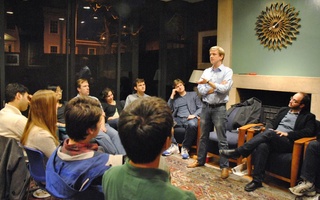UPDATED March 12, 2012, at 10:01 p.m.
Facebook co-founder Christopher R. Hughes ’06 announced Friday that he had purchased a majority stake in The New Republic, a magazine owned and edited for 35 years by former Harvard lecturer Martin “Marty” H. Peretz.
Hughes will assume Peretz’s titles of publisher and editor-in-chief of the Washington-based magazine. The details of the purchase have not been made public.
In a letter published by the magazine on Friday, Hughes wrote that he hopes to maintain the legacy of The New Republic’s long-form journalism while increasing the predominantly print publication’s use of new technology.
“The web has introduced a competitive, and some might argue hostile, landscape for long, in-depth, resource-intensive journalism,” Hughes wrote. “Although the method of delivery of important ideas has undergone drastic change over the past 15 years, the hunger for them has not dissipated.
“In the next era of The New Republic, we will aggressively adapt to the newest information technologies without sacrificing our commitment to serious journalism,” he added.
Peretz praised Hughes as someone who argues well and who cares deeply about the future of the magazine.
Speaking about his successor’s commitment to academics, Peretz cited Hughes’ undergraduate history and literature thesis on the Algerian Revolution. Hughes’ coupling of entrepreneurial success and academic interest made him stand out from other suitors, Peretz said.
“His own background in Facebook and other matters reassures us that he will carry us into the new generation of what magazines are going to be,” Peretz said. “There has never been anybody really around The New Republic who knew about these things and was committed to integrating them into the life of the magazine.”
That know-how will undoubtedly be bolstered by Hughes’ personal fortune. The Facebook co-founder is estimated to be worth $700 million—a figure which will likely increase when the company led by his former Harvard roommate Mark Zuckerberg goes public in the coming months.
In an interview with the New York Times, Hughes said that he is not hoping to turn a profit from the magazine and is willing to spend at a time when many rival publications are struggling to make ends meet.
Peretz said it is likely Hughes will increase the size of the magazine’s staff immediately and expand its coverage.
Hughes, who served as the first Facebook spokesperson, left the company in 2007 to serve as the director of social media for then-Senator Barack Obama’s presidential campaign. Hughes most recently founded Jumo, a social networking site for nonprofit organizations.
Hughes’ ownership continues a long tradition of Harvard alumni at the magazine, whose outsized political influence has often dwarfed its circulation. At many points, it has resembled a Harvard club that served as the launching pad for promising political writers and editors coming out of the University.
The magazine was founded in 1914 by Herbert D. Croly, who attended Harvard in the 19th century and received an honorary degree, and Walter Lippmann, Class of 1910. Over the years, the New Republic has counted four more Harvard alumni as editor and many others as writers.
Read more in News
Harvard Chinese New Year Gala Attracts 1,100Recommended Articles
-
Brief: Hughes Relieved From Top Post After 10 Seasons With TigersPrinceton football coach Roger Hughes has been relieved of his duties, the university announced yesterday.
-
Women's Hockey Splits N.Y. Road TripThe remarkable thing about reunions between friends is how little time changes their friendship. While the No. 10 Harvard women’s hockey team’s reunions with No. 2 Cornell and Colgate may not have been friendly, it seems that little has changed about the Crimson’s relationships with the two squads.
-
 Facebook Co-founder Discusses New Startup
Facebook Co-founder Discusses New Startup -
 An Evening with Champions 2011
An Evening with Champions 2011 -
 Seniors Seek Last Hurrah
Seniors Seek Last Hurrah -
With Back Bay Chorale, "Anything Can Happen"This Sunday, the Back Bay Chorale will be giving a whirlwind performance that includes the works of Mozart, Seamus Heaney, and rising composer Mohammed Fairouz. They will be performing Mozart's Requiem in D with Fairouz's "Anything Can Happen," a choral work inspired by Heaney's poetry.













